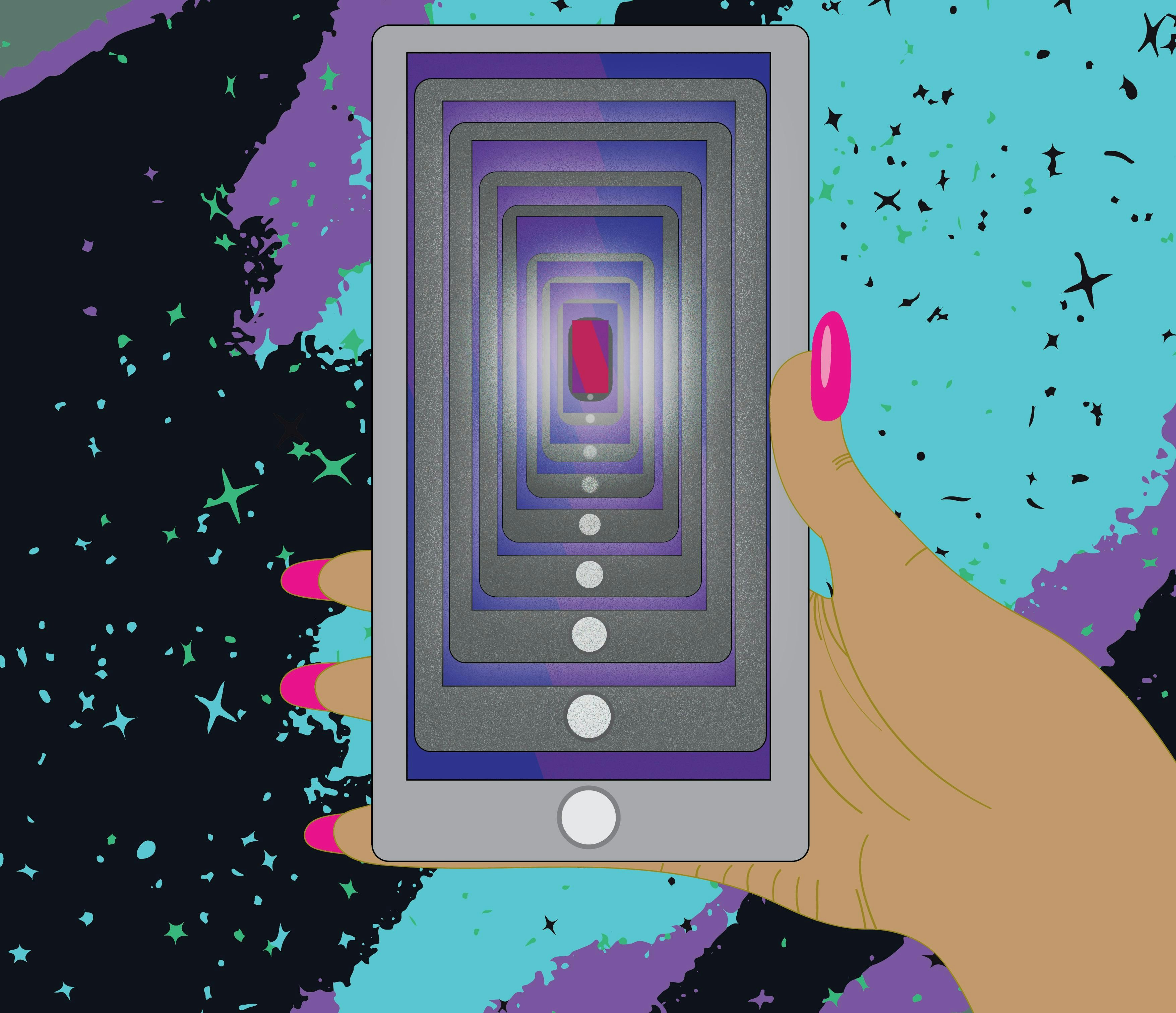Infinitely evolving, exploitable you: What's driving influencer coaching
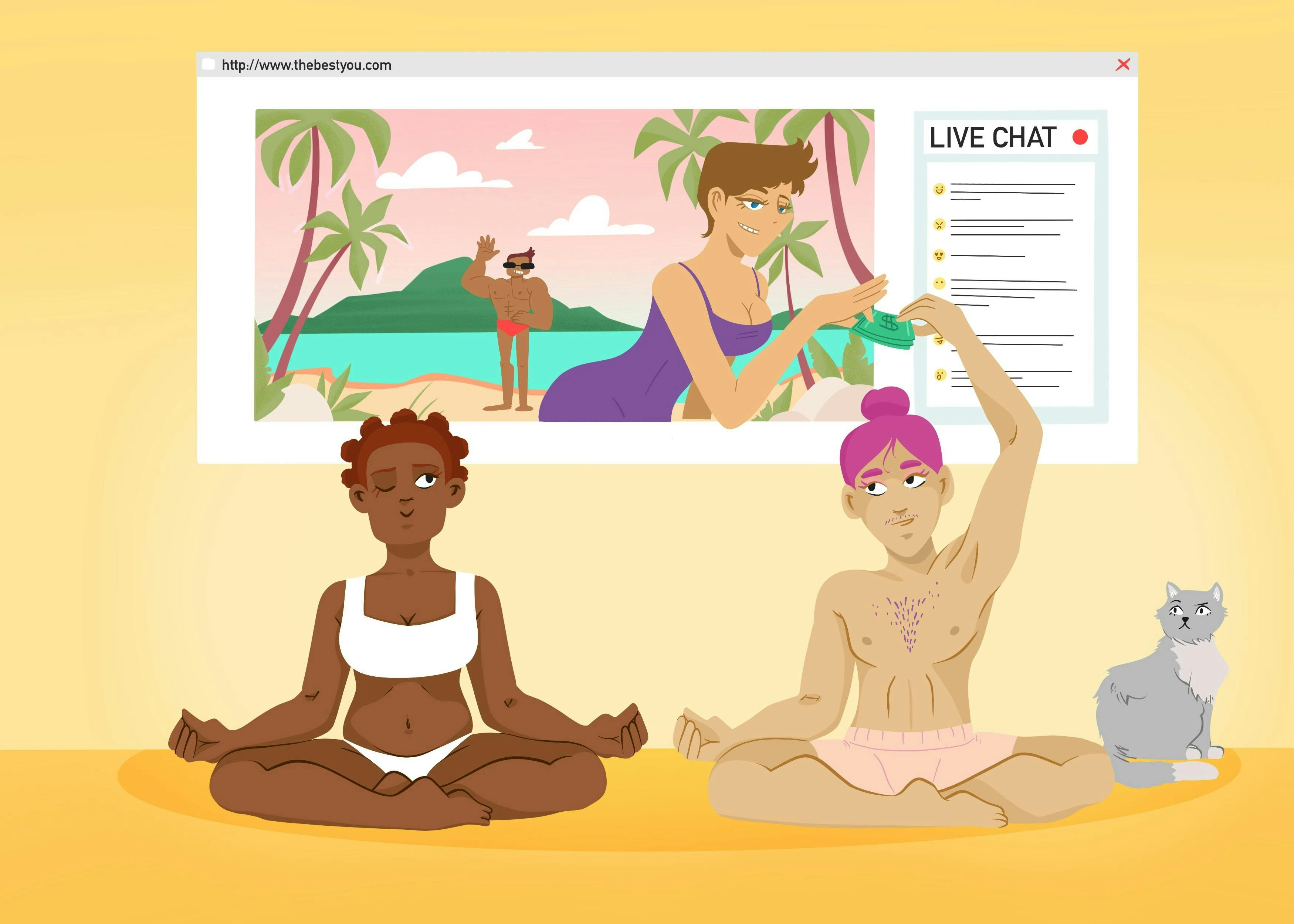
A pastel alien and cartoon mushrooms flank the foreground of a violet sky. It looks like a poster in a New Age incense store, or a Grateful Dead album cover.
Actually, it’s a banner for influencer wellness coach Alyse Parker’s YouTube channel. There, her community of “little aliens”—over 600.000 followers and 93 million viewers—can view her updates on manifestation, ending self-sabotage, and releasing toxic relationships.
Parker is a twenty-something university dropout with certification from the Institute of Integrative Nutrition. She offers a 12-week online Alignment Accelerator, with units on “Energy Tracking” and “Dream Alchemy,” available pending submission (and acceptance) of an application.
A separate, application-free offering, her 30-day Higher Self Initiation course, can be purchased for $444.
“I am here to help ambitious women who are committed to growth and ready to step into your full potential," says Parker on her website. “I am here to give you the permission slip to dream big + Level Up. I am here to teach you how to build confidence, enhance your productivity, and attract abundance. I am here to teach you how to cut ties from your past conditioning, remember who you really are, and create a life of fulfillment + freedom.” (Parker did not respond to requests for comment.)
From finding “life purpose” to mastering your inner critic—or improving health, orgasms, and finances—the internet’s made it one-click easy to find offerings like Parker’s. Many come with price tags of hundreds to thousands of dollars, to assist in quests for self-betterment.
Each elaborates on the infinitely exploitable promise of a better “you”—the product driving consumption.
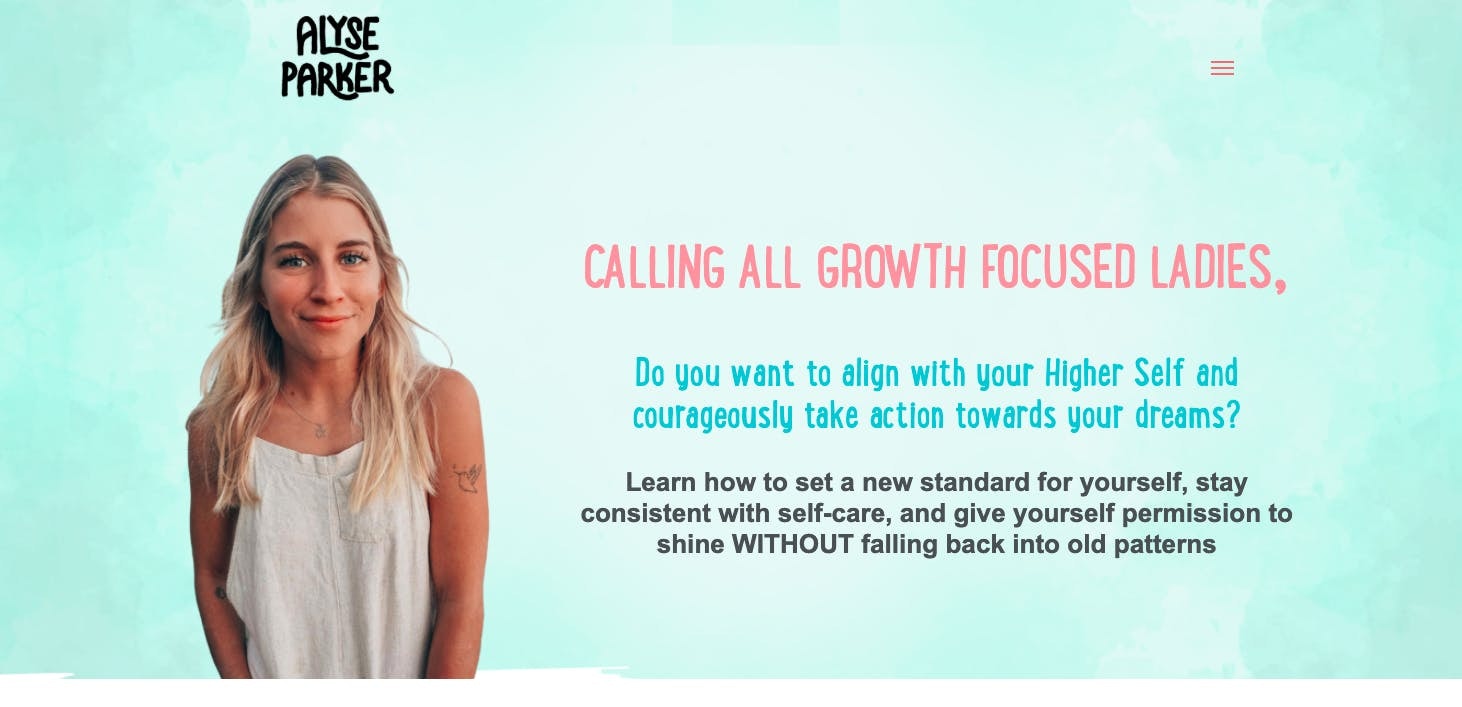
Alyse Parker's Higher Self Initiation course: "The reset you've been looking for."
A Virtual Economy Sans Oversight
In a May 2021 LinkedIn search for the title “Life Coach,” a staggering 1.370.000 global results appeared. "Wellness coach" yielded 545.000.
The International Coaching Federation (ICF), the industry’s foremost membership-based authority, defines coaching as “partnering with clients in a thought-provoking and creative process that inspires them to maximize their personal and professional potential.”
According to the ICF, the average cost of a one-hour coaching session is $244, but can go upwards of thousands for premium offerings. Its 2020 Global Coaching Study estimated 71.000 coach practitioners worldwide, with an estimated revenue of $2.8 billion.
The ICF’s post-pandemic follow-up study noted a rise in vision and life coaching, boosted by a lack of official requirements: “Untrained individuals who call themselves coaches.” Counsellors, psychologists, therapists or nutritionists must complete degrees and get state certifications, and undergo extensive training before they can provide service. In contrast, the wellness/life coaching industry remains vastly unregulated—a veritable Wild West, where anyone can self-title and post offerings online.
Independent certification programs do exist; the ICF credentials 33.000 coaches worldwide. There is also the Institute for Integrative Nutrition, the European Mentoring and Coaching Council, and UK-based Chartered Institute of Personnel and Development. But these certifications are not always equivalent to state-issued professional licenses.
"Individuals who resort to simply calling themselves coaches without proper training run the risk of not producing desired results for their clients, who have entrusted them to help make important decisions that significantly impact their lives, whether it relates to career, family, life-long goals or intensely private personal challenges and behaviours," says ICF CEO Magdalena Nowicka Mook.
Nevertheless, the virtual coaching economy is booming, thanks to self-improvement industry trends, COVID-19 lockdowns, and tech tools driving 24/7 connectivity. 74 percent of ICF survey respondents report using audio and video internet platforms for coaching. Their ubiquity—along with social live streaming, Instagram, and YouTube—opened new ways for wellness/life coaches to double as online influencers, with significant followings that translate into sales of retreats, coaching sessions, online courses, and workshops for thousands of participants.
Consider intuitive life coach Christie Marie Sheldon, whose Instagram and YouTube audiences can watch inspirational videos on "manifesting your magic," with snippets of her onstage presenting to packed rooms. For $349, her best-value Love or Above Mindvalley Academy course takes participants through modules of 12 energetic tool experiences: Guided meditations, exercises, and visualisation techniques, designed to "instantly raise their vibration." Ms. Sheldon lists her education as “School of Life” on her LinkedIn page.
Having grown up with Oprah Winfrey, Tony Robbins and The Secret, millennials dominate the influencer life coaching space, both as users and coaches. They seek empowerment and fulfilment, often as a cure for depression and anxiety, and are willing to pay coaches who present enviable affordances of success—images of lavish lifestyles, fit bodies, sold-out events, and redemptive narratives across robust social media accounts.
Some, like intuitive mindset coach Samantha Ruberto, become coaches after experiencing personal growth. On her website, Ruberto attributes her motivation to become a coach to leaving “white picket fence life” to travel the world ... but her reasons go deeper.
"I use my platform to share authentically about my journey of overcoming challenging experiences where I once felt very alone. For me, it was very much a calling," says Ruberto.
"I love helping women realise there are so many different ways to live their lives, bring more mindfulness into their days, and get curious about the whispers within their hearts. I think listening to and following your intuition is one of our greatest superpowers. And being able to cultivate it through curiosity, creativity, is what we explore in my coaching program The Vibrancy Method. From there, depending on my clients' goals, I help them create a tailored action plan to move forward."
The Vibrancy Method, priced at $2400-$4000 for VIPs as of July 2021, is a 12-week series of 1:1 coaching sessions. Among other features, it includes private support via Voxer, and was created to help clients take charge of their lives.
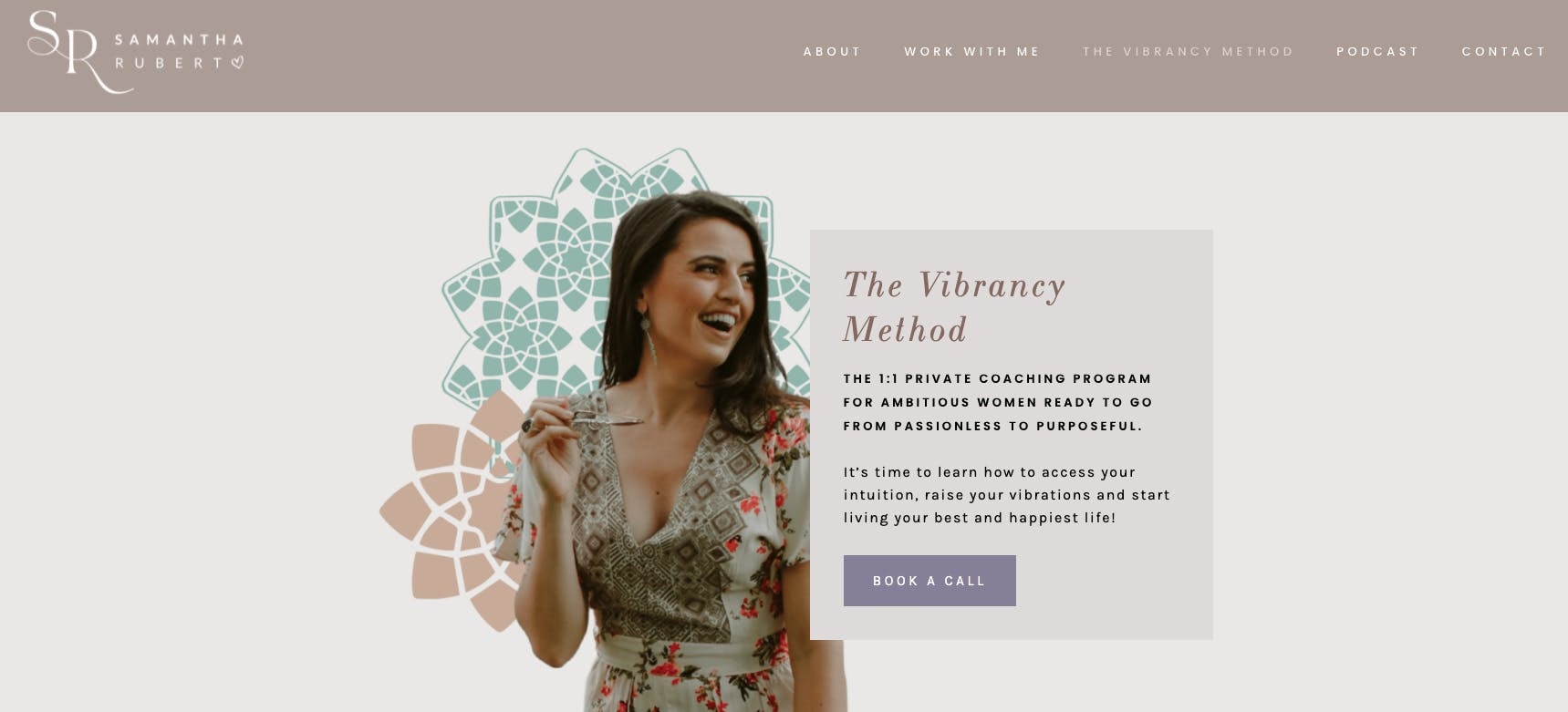
Samantha Ruberto's Vibrancy Method is designed to facilitate mindset change.
Intrinsic Needs and FOMO
Much of the sector’s force is driven by innate needs. In the 1943 paper "A theory of Human Motivation," Abraham Maslow presented his landmark Hierarchy of Needs, which illustrates how humans progressively pursue new needs as foundational ones are fulfilled. He describes a quilted pattern through which we seek to satisfy basic survival imperatives before advancing to “self-actualisation,” full development of one's abilities, and appreciation for life.
Maslow’s research suggests we are hardwired to strive for a purposeful existence, where our talents are rewarded and recognised. Thus we gravitate toward people who exude such success. Influencer coaches often present lavish images of personal triumph, peppered with revelations of authentic vulnerabilities—missteps in their own redemptive journeys. This makes them relatable and human.
They are, in essence, selling the stories we want to tell ourselves. Purchasing their insights could enable us to craft that new story, where we are healthy, successful, and thriving.
Sara Kuburic, a Canadian Certified Counsellor (CCC) in existential psychotherapy, and author of a forthcoming book, attributes the allure of influencer coaches to their accessibility on platforms millennials regularly use:
“They’re not only selling expertise but a lifestyle, success, and happiness as portrayed by their accounts. Therapists are either not on social media platforms, or their presence is largely educational, with limited information about themselves or their lifestyles.”
With enthusiastic client success testimonials on websites, and follower counts in the thousands, influencer coaches appear so authentic that we are perhaps willing to overlook aspects like qualifications. Often, relatability feels like credential enough … but challenges arise with this generalised trust.
After years building a business promoting a plant-based lifestyle and hosting vegan-inspired retreats, Parker posted a 2019 YouTube video about a 30-day carnivore diet challenge, claiming it was better for her digestion. The video was sponsored by ButcherBox. Outraged followers protested what one dubbed Parker's “extreme dieting veiled as wellness and transformation.” In a follow-up video, she explained her decision and addressed comments.
Parker has openly shared her struggles with self-harm, disordered eating, Adderall addiction, alcohol abuse, and toxic friendships. Her lifestyle change left followers calling for more accountability, and some self-awareness about what she sells. These areas are particular concerns for clients who turn to coaching to heal bonafide mental health issues in place of traditional therapy. (The ICF offers a guide for referring clients to counselling, but few like it exist.)
“Sometimes coaches contribute to this cycle by not being trained in mental health, yet are working with issues that are oftentimes rooted in it,” says Kuburic. “This is leaving individuals feeling disappointed or let down in the long run. People are walking away feeling 'broken' because they can’t seem to 'crack the code' or 'force/manifest' the life they want. It makes them look for the next influencer that can change their life.”
Kuburic says that many seeking coaching offerings consider therapy stigmatising, and thus less appealing. Online coaching offers near-instant results; why not choose a 10-day life coaching course over indefinite weekly therapy sessions?
But life coaching may trigger more frustration. Last year Sarah Akwisombe, an influencer who owns the No Bull Business School, sold “Smashing It,” a six-month money-manifestation success accelerator, to followers who paid over £1.000 for life and business advice (she is accredited for neither coaching nor financial management).
On Instagram, Akwisombe posts images of her happy family, successful entrepreneurship, and inspirational quotes. Several women told Refinery29 they were drawn to her colourful graphics and influencer status, but disappointed by the course’s lack of actionable direction. Akwisombe defended her offerings publicly, presenting satisfied reviews from other participants.
The ease with which people can exploit online coaching can taint the overall profession, closing some people off from an avenue that could potentially transform their lives and support personal growth, Ruberto observes.
“On the other hand, this issue also served to help me become an even better coach because I really do believe in the good of this industry," she adds. "Knowing that there's a bit of an uphill battle to the stigma has been the fuel to mastering my craft and allowed me to be in deeper levels of service to everyone I encounter.”
Ruberto is currently enrolled in the Institute for Coaching Mastery (accredited through the Association for Coaching), completed her 200-hour Yoga Teacher Training (YTT200), and is a certified Reiki Practitioner. She acknowledges the distinctions between coaching and therapy, and believes in attaining professional coaching certifications and continuous education, especially given the lack of industry regulation.
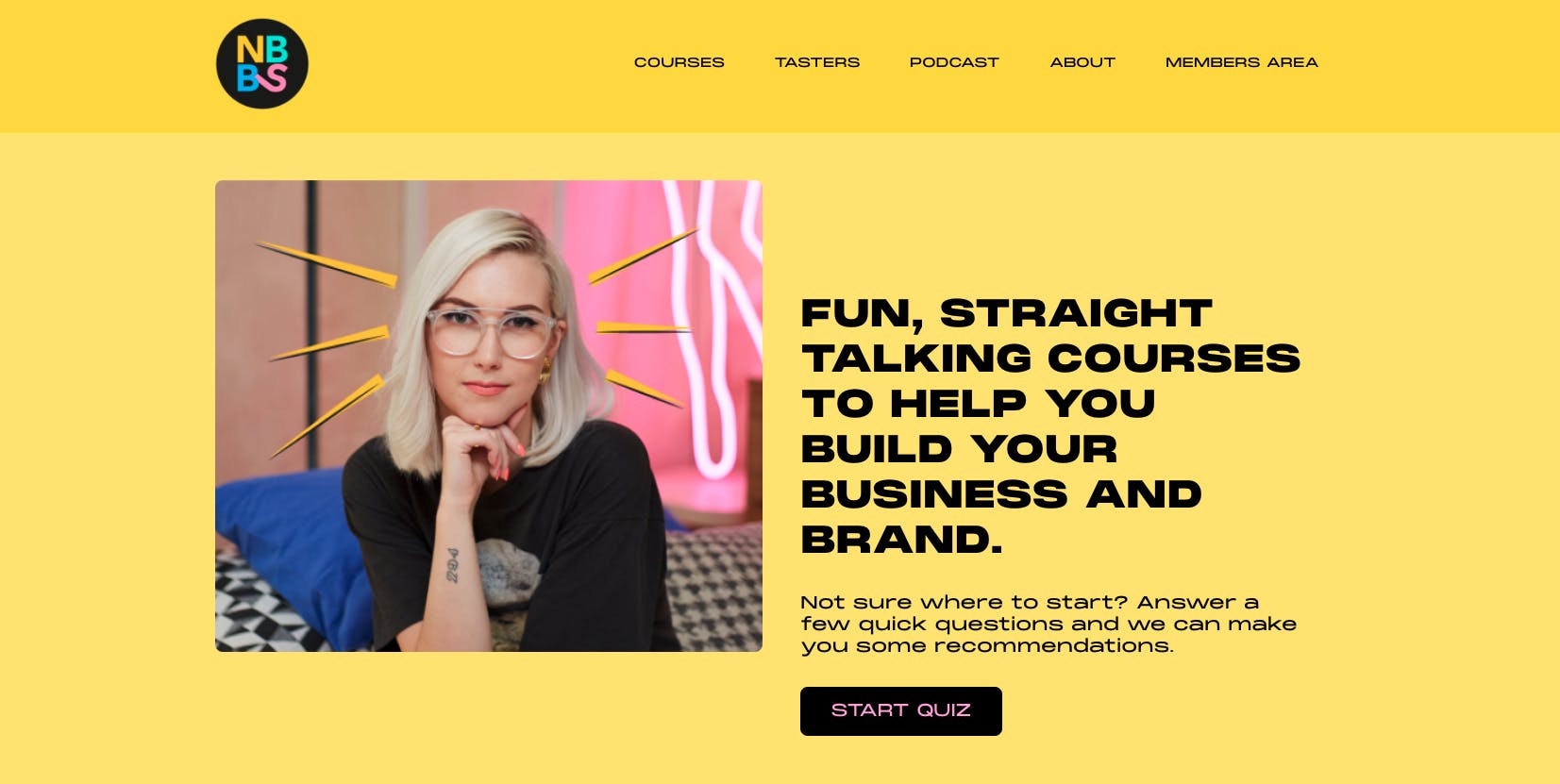
The No Bull Business School is led by influencer Sarah Akwisombe.
Don't Get Left Behind
Virtual coaching is also supported by what could be called the intangibility exclusivity value of virtual economies—similar to scarcity value, where an artificially low supply of something drives up the price.
Digital users increasingly pay for intangible products—subscriptions, online courses, access to communities, virtual items, and non-fungible tokens (NFTs); self improvement is just another. Some influencer coaches use promotional offerings, like limited workshop spots or exclusive/VIP access to retreats, to drive registrations. One reason these tactics work is FOMO culture—fear of missing out, a form of social anxiety our technology begets.
“FOMO effects” (a sales tactic) drive influencer coaching cohorts, especially among millennials and Gen Z, who are accustomed to comparing their lives with peers online. In pursuit of the most optimal version of themselves, they readily document their journeys and successes, increasing peer pressure to “level up” at the risk of missing out on financial, health, relationship, or career rewards enjoyed by actualised others.
FOMO fuels a “cult of self improvement” that in turn fuels purchases, an unending treadmill of betterment and optimisation that results in stress and feelings of inadequacy.
Danielle LaPorte, author of White Hot Truth, about the compulsive nature of aspiration, told Vogue, “Self-help has become another form of self-criticism, yet we have a hard time seeing when stuff becomes toxic because it looks … good on Instagram.” It “may feel addicting, competitive, and exhausting … downright destructive, creating the kind of slippery slope that may lead to low self-esteem and less-than-healthy behaviors.”
In other words, the market is infinitely exploitable, at times cultivating exactly the kinds of symptoms it promises to alleviate.
The Technology and The Self
Self-improvement narratives have larger implications in innovation capitalism. The early 2000s birthed a renewed focus on self-help, alongside a radical shift in the software development approaches that power current digital technologies and social media. The 2001 Manifesto for Agile Software Development popularised a framework of 12 principles that enable software to quickly adapt to changing business needs, by identifying user pain points and desires, then incorporating them into iteration feedback loops that beget a constant stream of improvements or pivots.
Notably, millennials see themselves as projects at which they can either succeed or fail. “This exacerbates struggles for self-love, self-compassion, and self-acceptance,” explains Kuburic, “because they may feel undeserving of them until they ‘fix’ themselves.”
Just as technology now chases an endlessly receding finish line, so do we. Productivity gurus like Tim Ferriss, author of The 4-Hour Work Week, provide tips and tech tools designed to optimise our lives with similar efficiency.
Our versions of self-improvement are influenced by the tech that facilitates them; we become mini betterment factories where “selves” are products for optimisation with their own “agile” cycles, driven in part by intrinsic motivations for self-actualisation, which is what influencer coaching offerings so often appeal to.
“In our current era of non-stop technological innovation, fuzzy wishful thinking has yielded to the hard doctrine of personal optimization,” writes Alexandra Schwartz in The New Yorker. She observes that tech founders have designed metrics for self-betterment, where we “must now chart our progress, count our steps, log our sleep rhythms, tweak our diets, record our negative thoughts—then analyze the data, recalibrate, and repeat.” In wellness and life coaching, optimisation can translate as “manifesting” desires effectively, meditating efficiently, choosing the healthiest diets, and fine-tuning life purpose narratives.
What's more, both tech and wellness culture are driven by redemption narratives, storytelling formulas where a protagonist traverses confusion and negative experiences before arriving at a redeeming, self-actualising outcome. Wellness/life coach narratives, and Silicon Valley hopefuls, routinely emphasise “finding one’s life purpose,” incorporating such narratives into their raisons d’être.
Similarly, the Hero's Journey, a narrative construct popularised by mythology scholar Joseph Campbell in his 1949 book The Hero with a Thousand Faces, describes a central character who goes on an adventure and encounters obstacles, only to become victorious after a decisive crisis that births an important revelation or purpose. Such narratives are contagious: They exude authenticity, and promise deliverance and cohesion from suffering.
Driven by this sense of purpose, wellness coaching consumers and tech entrepreneurs alike seek to forge a creation that saves the world, or rise like the mythical phoenix from their own ashes.
The impact of these narratives can be explained by our psychological response to influencer marketing: High follower accounts beget authority figures. So-called “consumer tribes,” coined by Seth Godin, gravitate around an idea of self-betterment, just as Silicon Valley investors respond to promising tech solutions.
Consider Theranos, Silicon Valley’s latest cautionary wellness innovation tale. Founder Elizabeth Holmes defrauded investors out of $700 million by spinning a Hero’s Journey narrative, where she strived to revolutionise blood testing technology so “people would not have to say goodbye too soon.”
Despite massive issues with her product, a device called the Edison, and her tendency to gloss over them, Holmes's mesmerising appearance and narrative won support from George Schultz, Henry Kissinger, and Rupert Murdoch, and the US pharmacy chain Walgreens began using the device.
Journalist John Carreyrou told ReasonTV that Walgreens’ adoption was due to FOMO, a desire so strong that it sidelined formal vetting processes.
Influencer Avatars: The Coaches of Tomorrow
The philosophical alignment between wellness coaching and tech will lead to greater intimacy between them over time. Imagine popping in some XR contact lenses to join a life coach avatar for an immersive 1:1 session, or attending a simulated Bali wellness retreat. We’re not far from these scenarios.
Virtual calling platform Mixitive (in beta) offers an AR calling feature, where you can scan yourself with a smartphone to create a lifelike avatar hologram that communicates face-to-face with others. Companies like CDR-U already use personal avatar coaches in their enterprise software, through a customisable program with similar coaching approaches in use by universities and hospitals. Virtual influencers—like Lil Miquela, one of Time's 25 Most Influential People on the Internet in 2018; and virtual supermodel Shudu Gram—boast significant followings, millions in earnings, and steady endorsement offers from reputable brands.
They exude that seductive sense of having it all. And they could be optimal coaches, able to offer what real people cannot: They don't age or get sick, can be fine-tuned to personal goals, and are accessible anytime. AI can further tailor them to us, and current XR technology already makes it possible for them to appear in our spaces.
Christopher Travers of Virtual Humans, which creates and researches virtual influencers, sees vast untapped potential for them in wellness coaching contexts.
“Virtual influencers are fictional characters who provide escapism, stimulation, and entertainment. Our current standard for relating with something on the internet is defined by the platforms we use. For most, a visual and some words in an enjoyable sequence are, at a refined level, all we need to connect with each other online,” says Travers.
“Nothing on the internet is real; all is merely a simulation and a reflection. Now, we’re able to accurately create these reflections from scratch.”
05 Nov 2021
-
Jessica Buchleitner
Illustrations by Macha Pulcini.
DATA-DRIVEN TECH & SOCIAL TRENDS. DISCOVERED WEEKLY. DELIVERED TO YOUR INBOX.
02/03
Related Insights
03/03
L’Atelier is a data intelligence company based in Paris.
We use advanced machine learning and generative AI to identify emerging technologies and analyse their impact on countries, companies, and capital.


